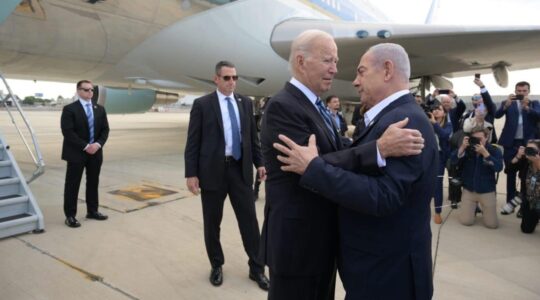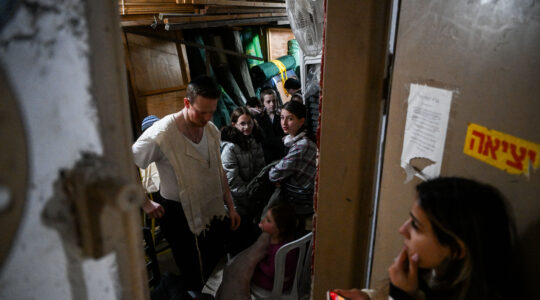GAZA CITY, Gaza Strip (JTA) – Ibrahim Al-Najar used to operate his own egg distribution business in Gaza City until about a year ago, when he was beaten and robbed at gunpoint.
“Masked gunmen surrounded our truck, forced us to the ground and stole our profits,” said Ibrahim, 21, who is married with two children.
Ibrahim had had enough. Politically independent until then, he sold his business and joined Hamas’ security forces.
“At least now I know that my family is safe,” Ibrahim told JTA while on patrol at the closed presidential compound in the Gaza Strip.
Since Hamas violently ousted the Palestinian Fatah faction from the strip in June 2007, the Islamist group has established a security presence that has brought Gaza residents a level of security unseen during the days of Fatah, despite Gaza’s crumbling judicial system.
This helps account for the popularity of Hamas – designated as terrorists by Israel, the United States and the European Union – in the Gaza Strip.
“Before the coup, I kept an automatic weapon in the shop. Now I feel safer,” said Osama, 42, a grocer in Gaza City. “The security is also psychological because when Israel attacks, Hamas fights back.”
For many Gazans, however, the security has come at a heavy price: limits on individual rights and an international embargo of Gaza, which has shattered the area’s economy.
“We have lost our freedom of speech and the press,” said Hythem Abu-Thaher, 20, a student at Al-Aqsa University.
Women and young people feel pressured by the police presence to conform to Hamas’ religious norms. While arrests are uncommon, aggressive questioning and monitoring are de rigueur, particularly when unmarried men and women try to socialize with each other.
“We can move freely, but as women we can’t socialize freely,” said Sanna Al-Louh, 23, who owns an art shop in Dier Al-Balah. “People are afraid, so they keep silent.”
“Security has been achieved through fear,” said political analyst Talal Okal, a member of the board of trustees at Al-Azhar University, a Fatah bastion in Gaza. “But we do not want the corrupt leaders back.”
On Monday, Hamas police and supporters beat up Fatah-sympathetic professors and students at Al-Azhar, according to reports. Police reportedly intervened when Fatah supporters tried to break up a Hamas rally for the late Hamas leader Sheik Ahmed Yassin, who was killed in an Israeli airstrike. Several people were injured, though Hamas officials said police merely were restoring order.
Many Gazans, particularly Fatah supporters, feel threatened by the police and say their “security procedures” are invasive.
Gaza’s courts also have suffered under Hamas.
“After Hamas took control, the attorney general in Ramallah ordered all district attorneys and administrative staff in Gaza to stay at home, threatening to withhold their salaries if they returned to work,” said Hamdi Shaqqura, the director of democratic development at the Palestinian Center for Human Rights in Gaza. “The criminal court system stopped.”
Hamas has struggled to fill the empty slots with attorneys and judges, whom observers say are less qualified.
Shaqqura also has documented problems with the Hamas penal system, such as limited access to and visitation rights for prisoners, and dozens of cases of ill treatment and torture. Things were not measurably better under the Fatah-led Palestinian Authority, however.
“There are human rights abuses by Hamas security against Fatah members in Gaza, and likewise by P.A. security in the West Bank against Hamas,” Shaqqura said.
Yet under Hamas, residents say, lawlessness in Gaza has declined significantly.
“Now you can go to the police for help,” said Abdel-Rahman Abu Ada, 27, an accountant from Gaza City. “Beforehand, people had to seek help from factions, like Al-Aksa Brigades” – Fatah’s military wing. “The armed militants in the streets were terrifying.”
Hamas has adopted a number of measures over the past few months that have reduced the type of gang-style violence that was typical of Gaza when it was ruled by Fatah. Police are deployed across this city, civilians are forbidden from carrying arms in the street, face masks are banned and Hamas police are quick to respond to complaints.
Carjackings, kidnappings and violent family disputes, common under Fatah, have declined significantly under Hamas. Shops that used to shutter their doors early in the evening now stay open past midnight. And though they are still being trained, Hamas’ approximately 8,000 police officers have a more visible presence in Gaza than did Fatah’s 15,000 security police.
Hamas police also operate checkpoints across the strip, checking drivers’ identification and searching for suspicious material. Traffic police are also posted at intersections during rush hour.
Hisham Abu-Shabaan, a money changer in Rimal, said he was robbed twice by militants when Fatah was in charge of Gaza. He and his sister used to count their money with Kalashnikovs by their side.
“Now I can run my shop unarmed,” he said. “Hamas gave us security.”
“But,” he adds, “people need more than security: We need an economy and open borders.”
The blockade of Gaza, in place since Hamas took over last June, has brought the strip to the verge of economic collapse. The World Bank says the unemployment rate in Gaza is 30 percent and the United Nations says some 80 percent of Gazans live below the poverty line.
Enrollment in U.N. food programs has risen to nearly 1.2 million people out of Gaza’s total population of 1.4 million, according to John Ging, the head of the U.N. relief agency’s operations in Gaza.
Israel has heralded the embargo as part of a strategy to weaken Hamas, whose military units regularly fire Kassam rockets at Israeli civilian population centers.
But the blockade, which has gotten a mixed response from the United States and the European Union, has had little impact on reducing attacks from Gaza against Israelis. And in Gaza, support for Hamas has grown, not declined, according to polls.
No deal is on the horizon to bring Fatah back to Gaza, despite talks between Hamas and Fatah last month in Yemen. Fatah wants Hamas to cede control of Gaza as a precursor to serious negotiations over a power-sharing agreement.
“For Hamas, relinquishing control means that we return to a unity government and a power-sharing system,” said Ahmed Yousef, an adviser to Ismail Haniyeh, the Hamas leader and deposed Palestinian Authority prime minister. “The security forces must first be restructured in a way that is acceptable to Hamas and Fatah.”





